Infused with rich olive oil and fresh herbs, marinated cheese curds are an easy small plate that tastes just like a Greek island holiday. Enjoy these squeakers as a savory snack, a mezze platter or a part of your charcuterie board at your next party or event.
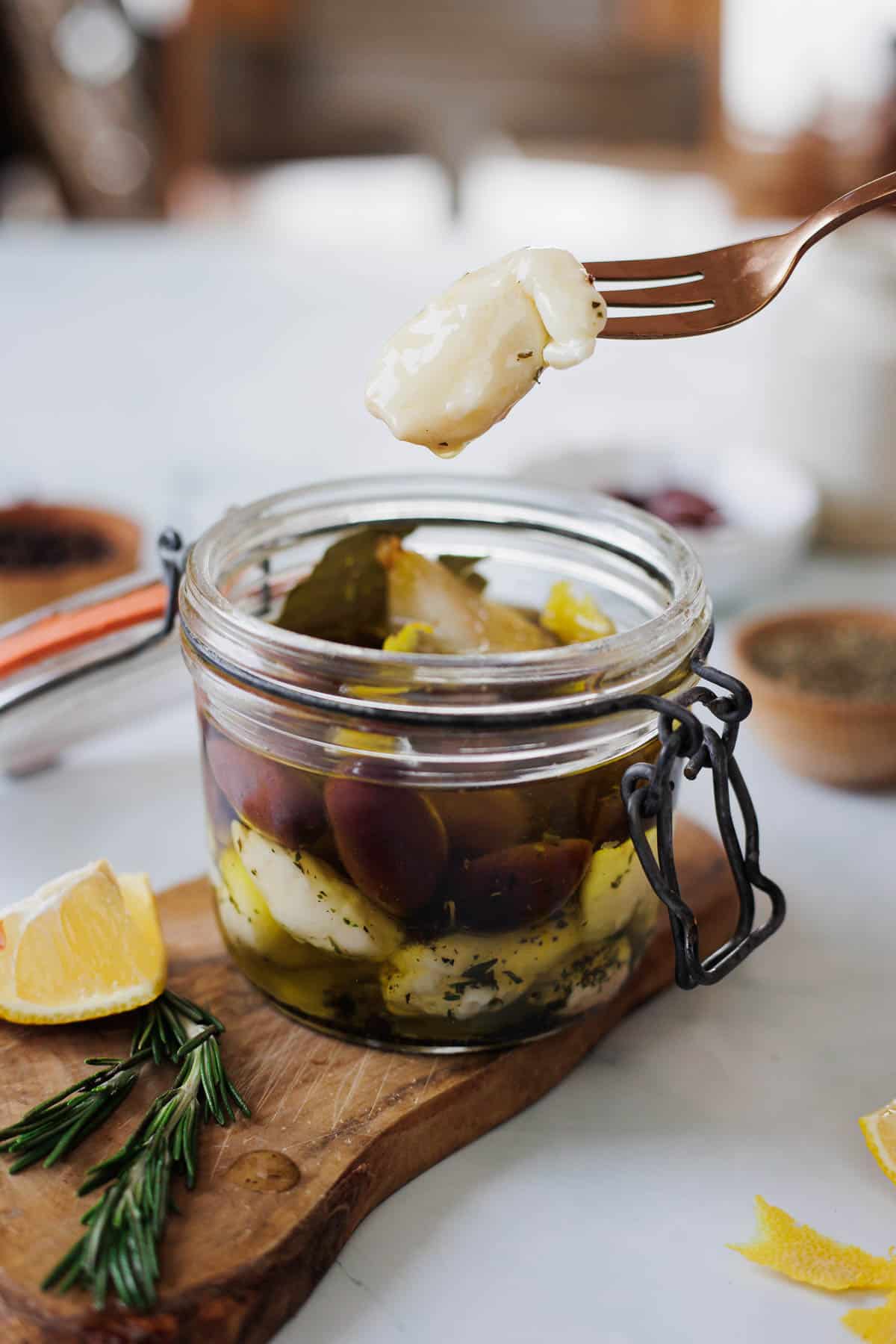
In Middle Eastern, Spanish and Greek cultures, it's customary to eat a spread of small, artfully made plates that are big on flavors and the use of fresh ingredients. During my trip to Athens, I loved the lengthy meals outside with numerous variations on eggplant dips, roasted red peppers, salads with feta, and different cheese plates. This Greek-style marinated cheese curds recipe came out of my attempts to recreate the marinated feta cheese appetizer I tasted in Greece, which blew me away with its deep flavor.
The secret to making fresh cheese curds take on as much flavor as possible is to use high-quality extra virgin olive oil (I use my favorite slow-produced Greek olive oil). That oil combines with different herbs and spices—oregano, rosemary, bay leaves, garlic, peppercorns and lemon rind—and heated to a simmer. The warm olive oil is then poured on the fresh curds, infusing them with loads of flavor. As they sit in the fridge overnight or even for a few days, the curds are marinated and become a sort of pickle.
With minimal cooking and maximum flavor, this super easy recipe is one tasty way to eat cheese!
What are Cheese Curds?
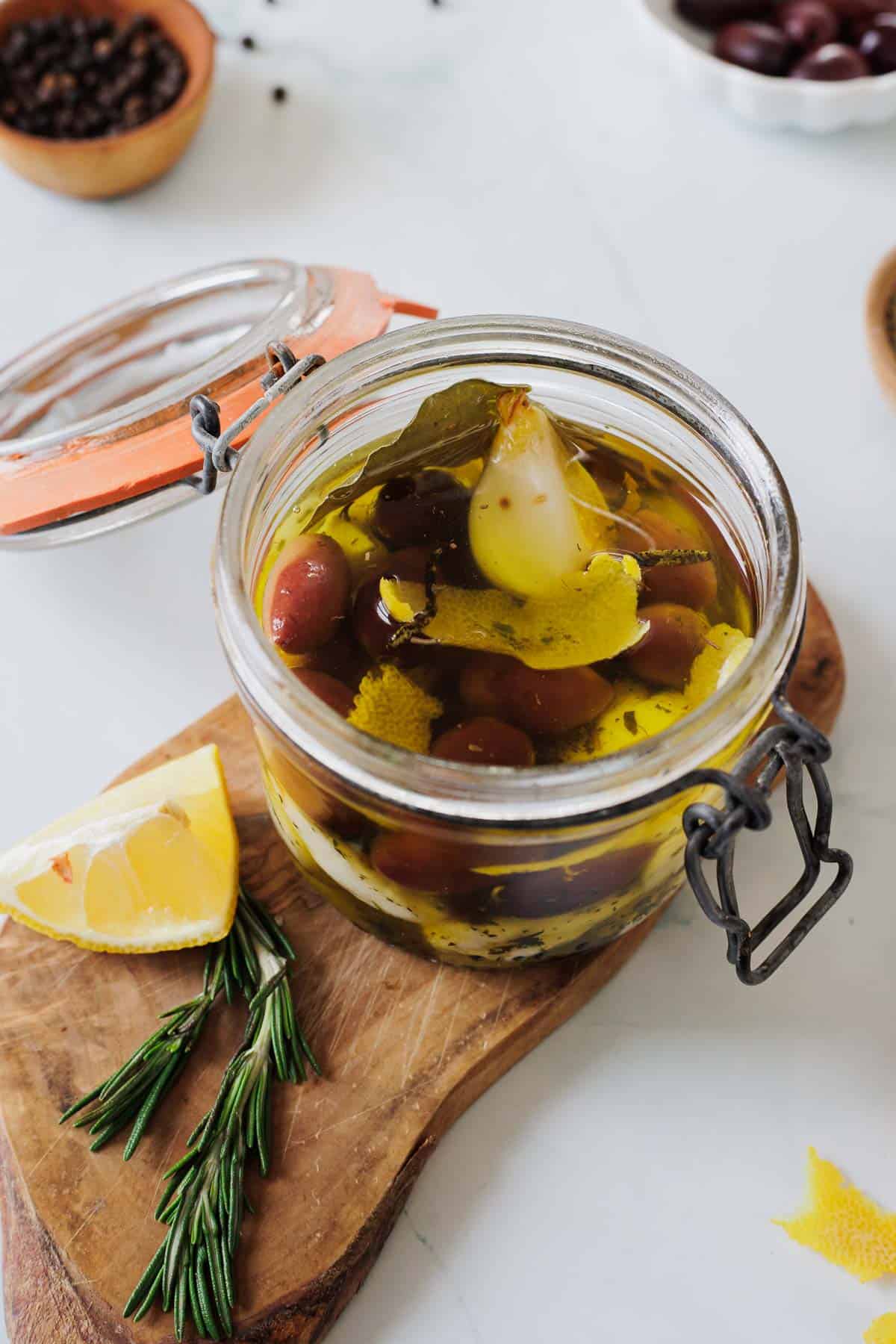
Most often found throughout the United States and Canada, cheese curds are a type of soft cheese. Traditionally, cheese curds are produced from cow’s milk and are thought of as a “young” cheddar cheese. Cheese curds are a fundamental part of Canadian poutine, but can also be fried, dipped, or simply enjoyed as they are.
Cheese curds have a slightly rubbery texture but get creamy when fried (I love air frying cheese curds!) Cheese curds are known for the very distinct squeaking sound that occurs when you eat them. It is said that the fresher the curds are, the more they squeak when you bite into them. That's why these squeaky cheese balls are nick-named "squeakers".
If you're worried about the noise, rest assured that squaeking is merely a result of the cheddaring process. Essentially, cheese curds develop tight protein and calcium structures from the cheddaring process that rub against the enamel of your teeth when you eat them - producing a slight squeaking sound. If your cheese curds don’t squeak, it's just a sign that the protein and calcium structures are loosening and they're still perfectly good to eat.
How can I serve Marinated Cheese Curds?
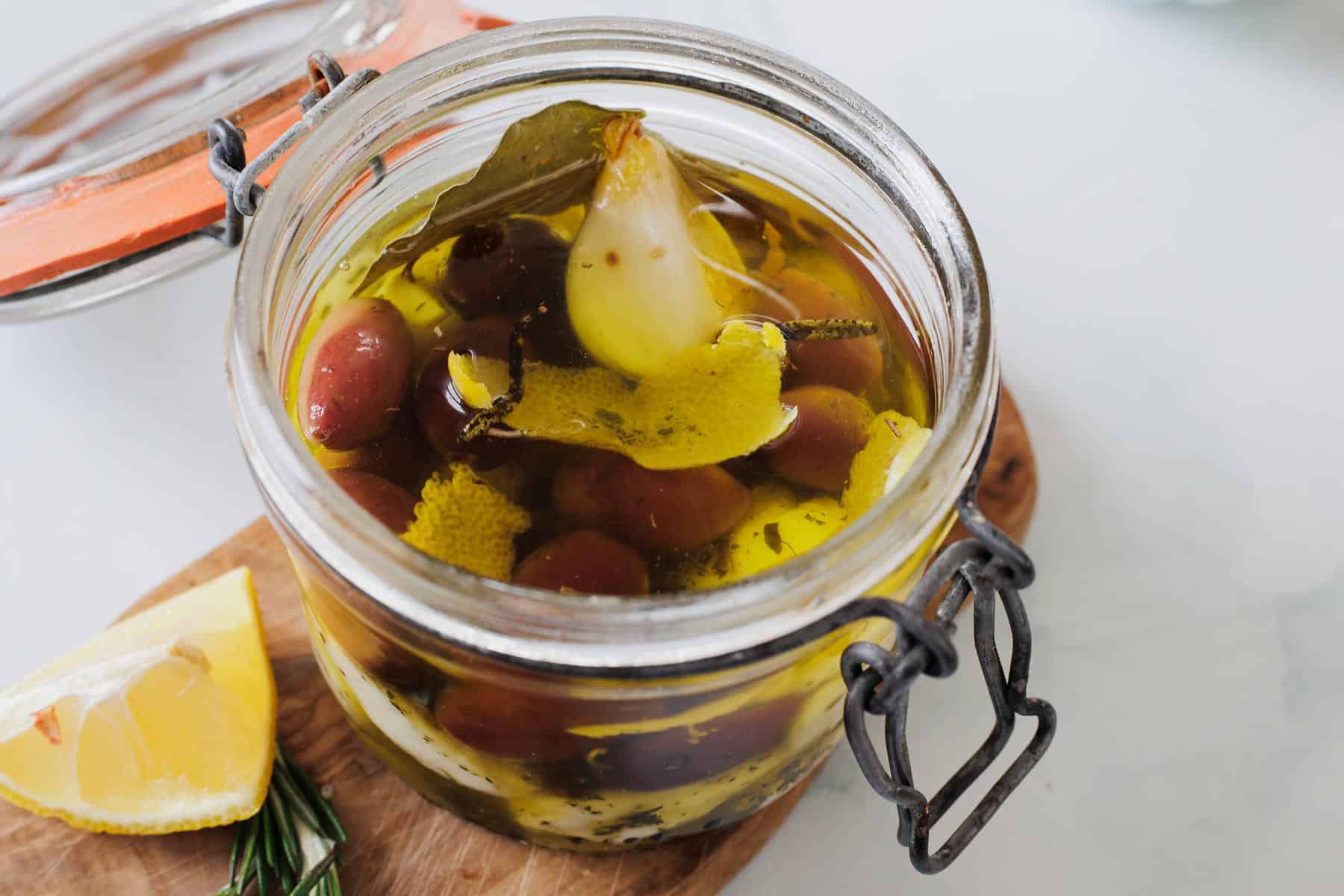
I have yet to find a salad recipe that isn't made better with the addition of these marinated cheese curds. You can keep them on hand for a late afternoon snack or add them to a charcuterie tray for a party.
They’re also wonderful when tossed into a pasta recipe or treated as an appetizer for an outdoor lunch or dinner. I also love to add them to small wooden skewers with a cherry tomato and drizzle of balsamic glaze for a fun play on a Caprese salad.
Once you made this recipe, you will fall in love with the curds' fresh and surprising flavor! I recommend you try frying them next.
Ingredients You Need to Make Marinated Cheese Curds
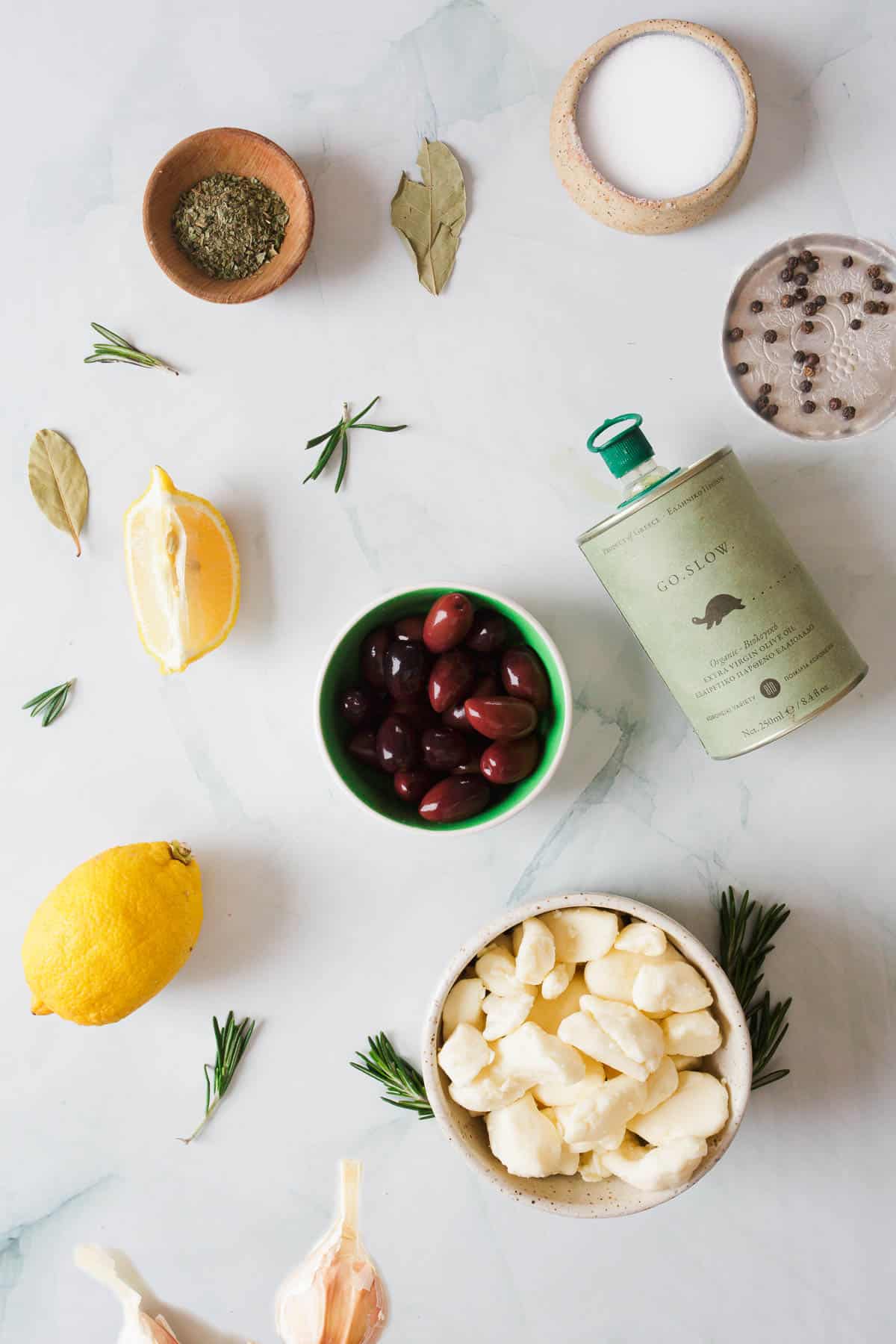
When making marinated cheese curds, you will want to use the most flavorful ingredients to infuse the curds with a delightful taste. Here's what I use to ensure a perfect batch every time:
- fresh cheese curds: The heart of the dish, these bite-sized delights are perfect for absorbing the flavors of the marinade.
- extra virgin olive oil: I opt for a high-quality Greek olive oil as the base of the marinade to give it a rich, smooth texture.
- Fresh garlic cloves: For that punch of piquancy, I like to include a whole garlic clove.
- Bay leaves: They lend a subtle yet complex aroma to the marinade.
- Rosemary: A fragrant herb, rosemary adds a touch of woodsy flavor.
- Black peppercorns (whole): These little spice bombs contribute a sharp, piquant taste.
- Dried oregano: Its robust flavor complements the creamy curds beautifully. You can use fresh oregano or substitute it with thyme or fresh basil leaves for a different profile.
- Strips of lemon peel: For a zesty kick, I include a few strips of lemon peel, making sure to avoid the bitter white pith. The lemon peel infuses the oil mixture with a delicate flavor that I prefer to using zest.
See recipe cards for exact quantities.
Equipment
How to Make Greek Marinated Cheese Curds
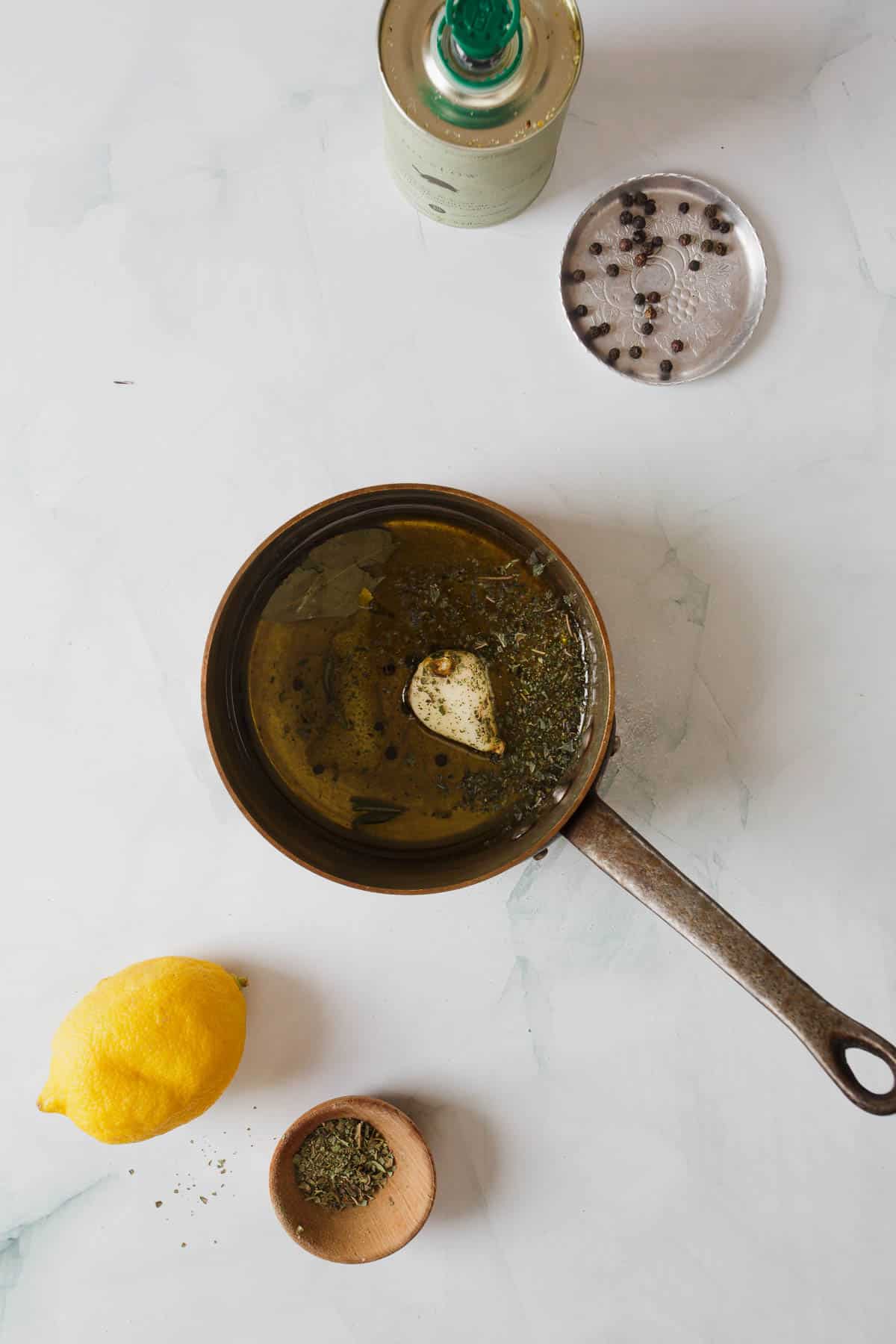
Warming the Olive Oil
Start by selecting a saucepan and setting it on your stove over medium heat. Carefully measure out 1 cup of olive oil and pour it into the saucepan. The goal is to warm the oil gently, which will serve as the base for the marinade.
Mixing in Aromatics and Seasonings
Once the oil is warm, it's time to mix in your aromatics. Add a whole garlic clove, making sure it's clean and intact, a couple of bay leaves for their unique aroma, a fresh sprig of rosemary for its piney flavor, a teaspoon of black peppercorns, and a teaspoon of dried oregano. Sprinkle in a pinch of salt and pepper to season the oil.
Infusing the Oil
Allow the mixture to heat for about 5 minutes. Keep a close watch to ensure that the garlic clove doesn't brown. If it starts to change color, lower the heat immediately.
Cooling and Straining the Infused Oil
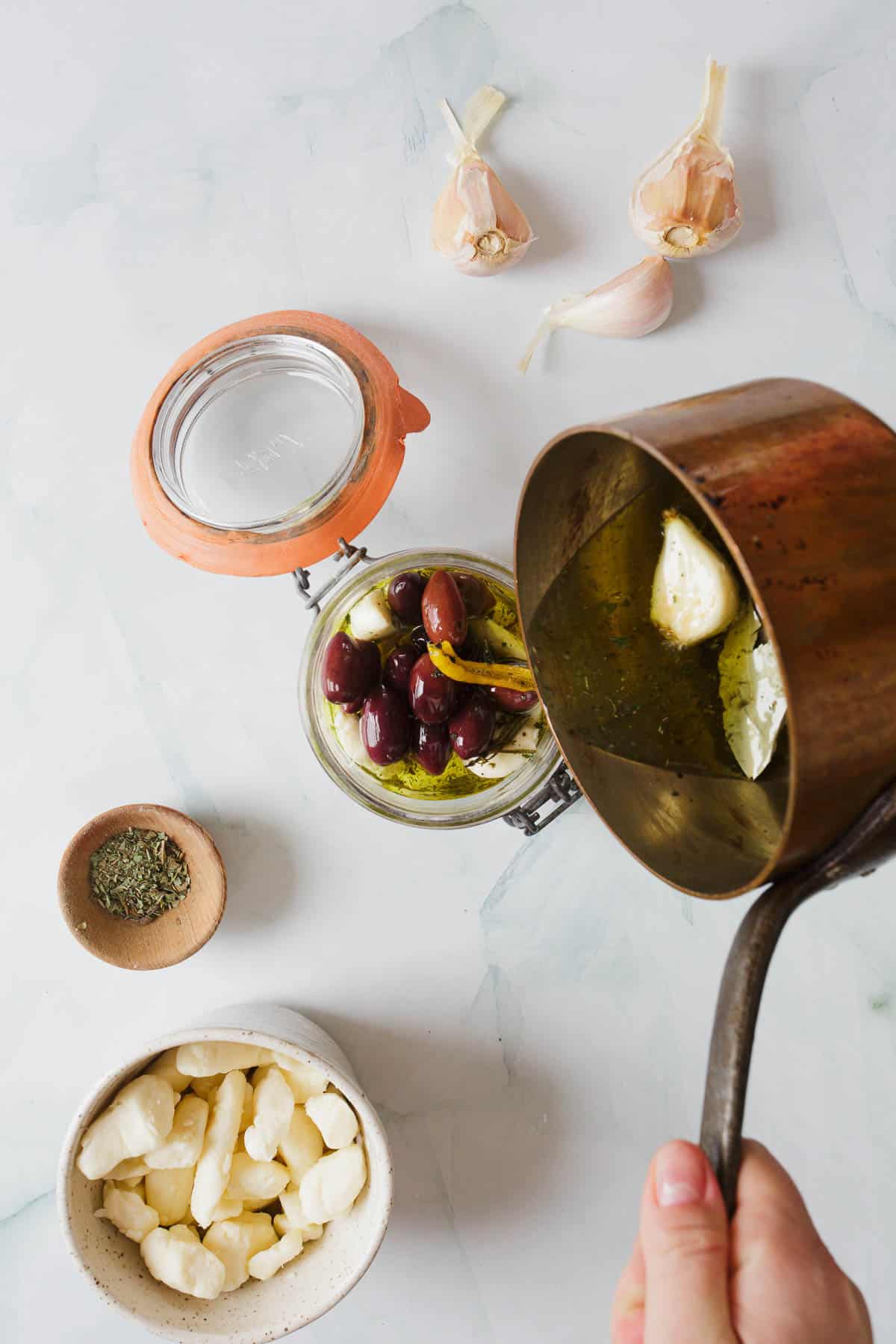
After the infusion process, take the saucepan off the burner and let the oil cool down for a few minutes, allowing the flavors to meld.
Straining the Mixture
With a strainer at hand, separate the solid herbs and spices from the olive oil. Ensure all the solids are removed to maintain a smooth texture for the marinade.
Marinating the Cheese Curds
Transfer 2 cups of cheese curds to a jar with a lid or seal. Gently pour the cooled, strained oil over the cheese curds. Add strips of lemon peel and garlic for a citrusy kick.
Sealing and Marinating
Seal the bowl with a tight-fitting lid or cling wrap and refrigerate. For optimal flavor infusion, let the cheese curds marinate for 24 hours to 7 days.
Serving the Olive Oil Marinated Cheese
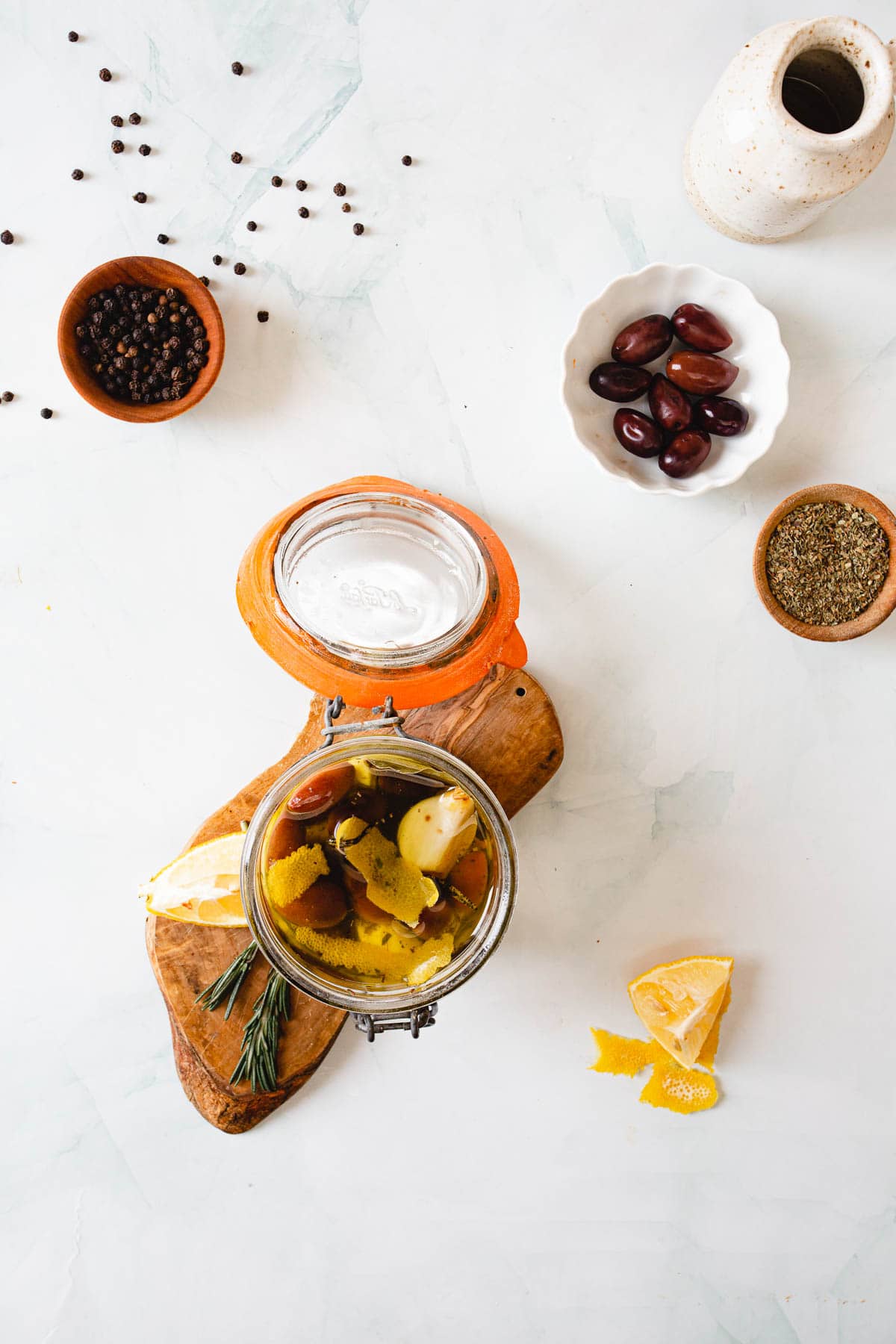
When you're ready to serve, remove the bowl of marinated cheese from the fridge. The chilled, olive oil marinated cheese makes a perfect addition to any cheese board. It can also be served as a standalone appetizer with crusty bread, tossed into salads for an extra punch of flavor, or used to top a warm dish of roasted vegetables. For a Mediterranean touch, mix the marinated cheese with olives and cured meats.
Enjoy the rich, aromatic flavors of your homemade olive oil marinated cheese, a delightful treat that's sure to impress on any cheese board or dish.
Storage
You can keep the olive oil marinated cheese curds in an airtight container in the refrigerator for up to two weeks. However, I don’t recommend freezing the cheese curds because it will impact the texture.
Top Tips
Use Fresh Herbs. Dried herbs are a wonderful part of any pantry, but fresh herbs will really work best here. The fresh herbs impart a much stronger flavor into the cheese curds than their dried counterparts.
Bring to Room Temperature. The cheese curds should be kept in the refrigerator as they marinade, but then brought to room temperature before serving. This makes the cheese curds more enjoyable to eat and also helps thin the marinade out.
Variations
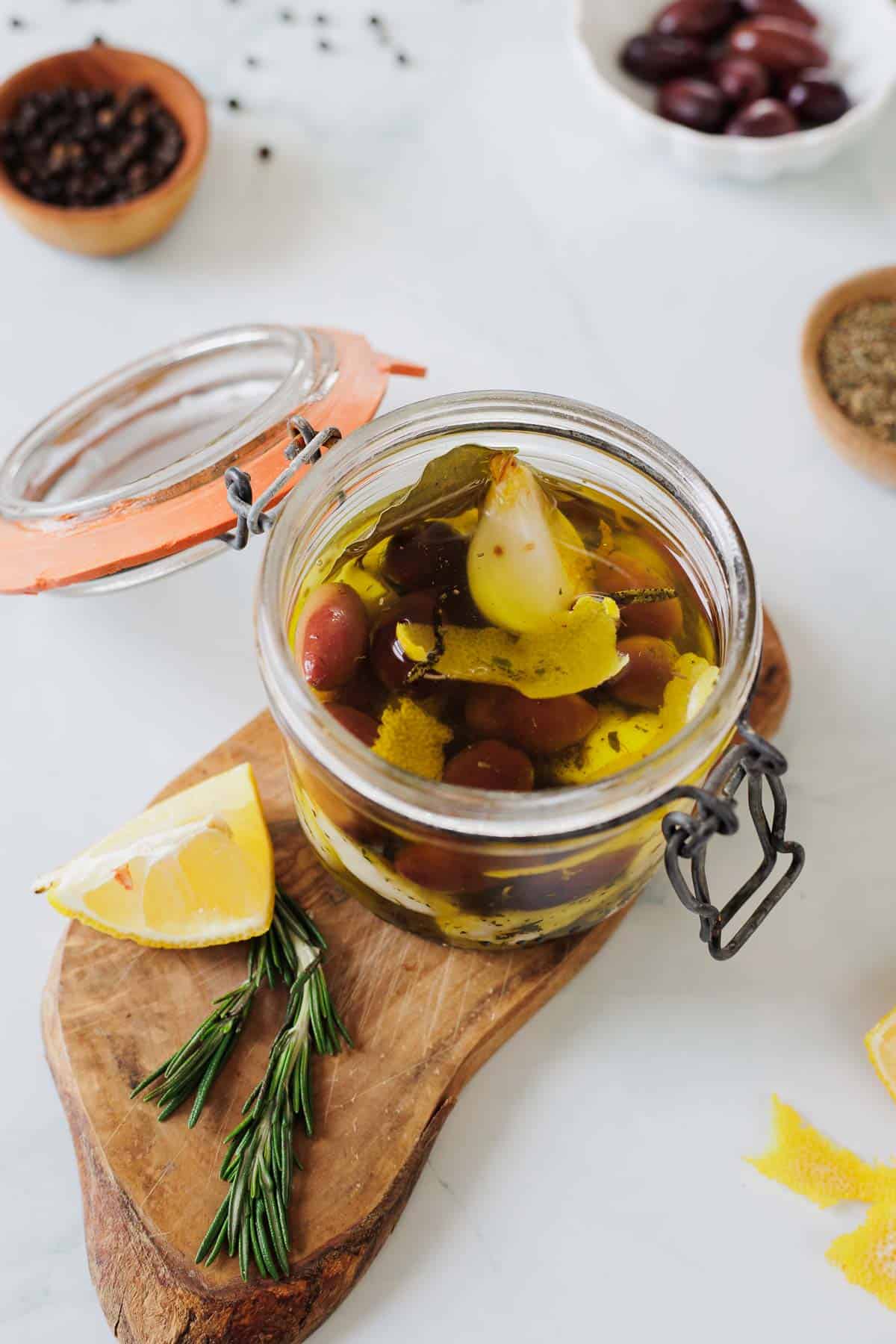
● Marinated Cheese Curds and Olives - Add in a cup of green olives and a cup of Kalamata olives for an extra briney version of these marinated cheese curds.
● Spicy Marinated Cheese Curds - If you’re looking for a bit of heat, add in a dash of red pepper flakes to the marinade liquid. You can adjust the amount of red pepper flakes to suit your personal spice preference.
What should I do with the marinade from the cheese curds?
Don’t toss out the cheese curd marinade! You can use the marinade to produce another round of marinated cheese curds, as the base for a salad dressing, or as a delicious dip for bread.
How long should I let the cheese curds marinade?
At the bare minimum, the cheese curds need to marinade for at least an hour. However, the longer they marinade, the more the flavor will infuse into the cheese curds. You can allow the cheese curds to marinade for up to two weeks, as long as they are in an airtight container in the refrigerator.
Accompanying dishes
I love serving this marinated cheese recipe as part of a charcuterie board. It also works in a Greek-inspired meal with my vegetarian moussaka. Try it alongside Greek mashed potatoes with beet greens. You can also pair it with baked feta for a cheesy appetizer spread.
For more delicious, cheesy recipes, explore these dishes:
● Baked feta dip appetizer with dates, hazelnuts, and honey
● Colombian Baked Plantains Recipe with Guava and Cheese
Recipe
Tried and loved this recipe? Please leave a 5-star review below! Your reviews mean a lot to me, so if you've got any questions, please let me know in a comment.
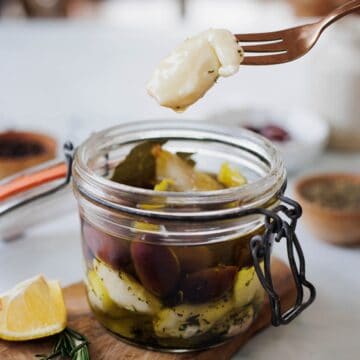
Greek-Style Marinated Cheese Curds Recipe
Ingredients
- 2 cups cheese curds
- 1 cup olive oil
- 1 garlic clove peeled
- 2 bay leaves
- 1 sprig of rosemary
- 1 teaspoon black peppercorns
- 1 teaspoon dried oregano
- Strips of peel from 1 lemon
Instructions
- In a saucepan, gently warm 1 cup of olive oil over medium heat.
- Add the garlic clove, bay leaves, rosemary sprig, black peppercorns, and dried oregano to the oil.
- Heat the mixture for about 5 minutes to infuse the oil, ensuring the garlic does not brown.
- Take the saucepan off the heat and allow to cool for a few minutes.
- Strain the oil to remove the solids.
- Place 2 cups of cheese curds in a bowl.
- Pour the strained oil over the cheese curds.
- Add the lemon peel to the bowl with the cheese curds and oil.
- Cover the bowl and refrigerate to marinate for at least 24 hours, but for best flavor, leave it for 3 to 7 days.
- Serve the marinated cheese curds chilled.
Notes
- After marinating, serve the chilled cheese curds as a standalone appetizer with crusty bread, as part of a cheese platter, or use them to enhance salads or top off a warm dish of roasted vegetables. They also pair well with olives and cured meats for a Mediterranean-inspired snack.
- When you're ready to serve the marinated unaged cheese, remove from refrigerator at least 30 minutes in advance. The flavors get more pronounced when they come room temperature.


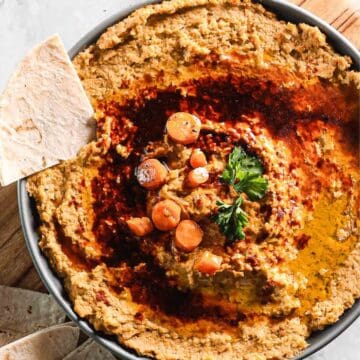
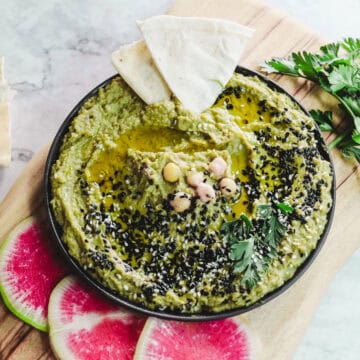



Tammy says
This is a lot like the marinated mozzarella balls I've made a few times. EVOO, garlic, fresh herbs, lemon peel. I can't wait to try this with cheese curds.
kseniaprints says
It's very similar!